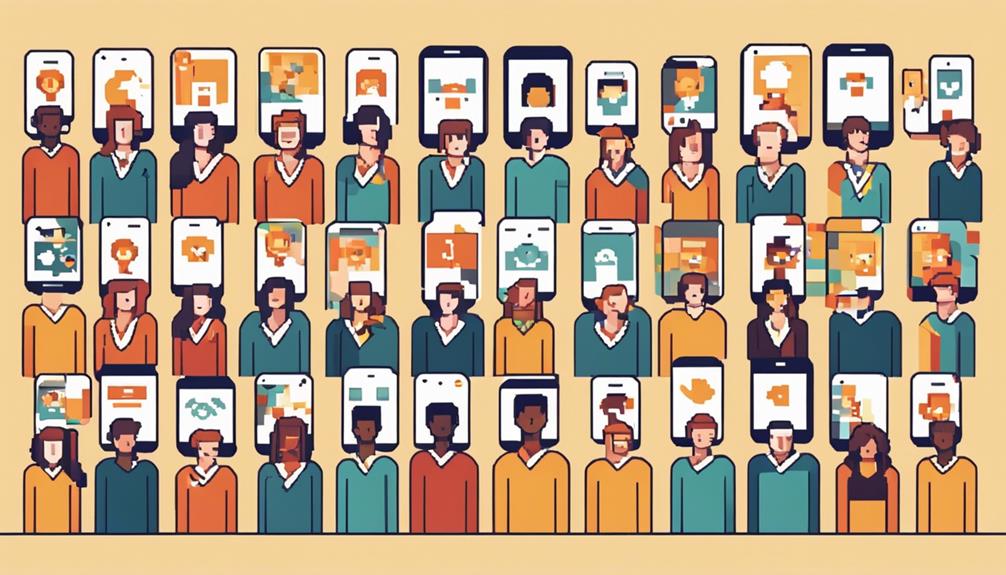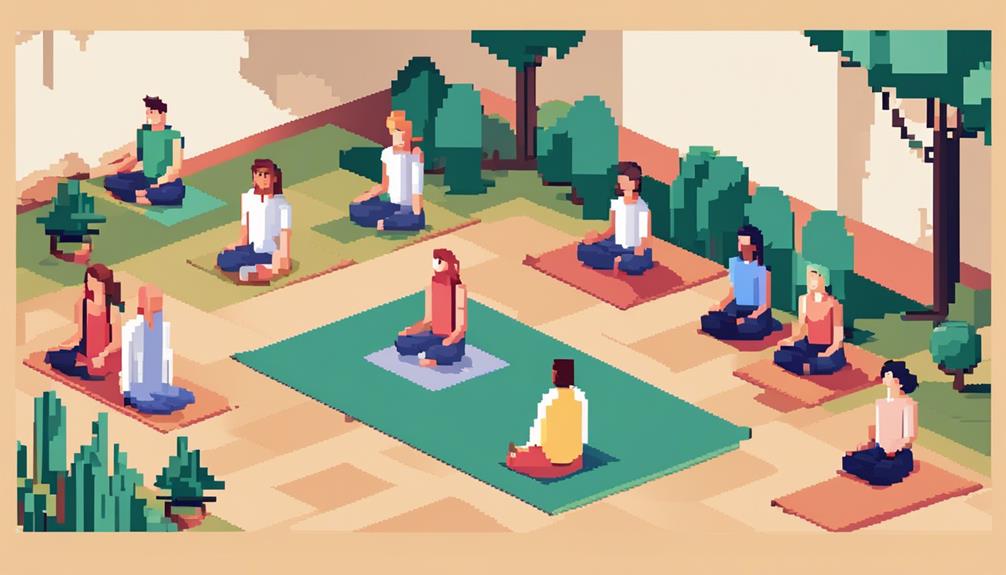In today's world, society's fixation on self-improvement drives a relentless pursuit of personal growth. From schools promoting self-esteem to social media shaping ideals, the cultural shift towards personal development is evident. However, the commercialization of the self-help industry often prioritizes profit over genuine progress, fostering unrealistic standards and psychological consequences. To navigate this landscape, a balanced approach advocating self-compassion, critical evaluation of advice, and acknowledging external support is vital. Understanding the challenges to the self-reliance myth can provide a more realistic perspective on individual success. Embracing these insights can lead to a more holistic view of self-improvement.
Key Takeaways
- Self-improvement obsession stems from societal pressures for constant growth.
- Media perpetuates idealized standards, fueling the fixation on personal development.
- The self-help industry capitalizes on insecurities, promoting quick fixes.
- Unrealistic expectations from self-improvement culture contribute to mental health challenges.
- Balancing self-improvement with self-compassion is vital in navigating societal pressures.
Cultural Shift Towards Personal Development
The cultural landscape is evolving towards a heightened focus on personal growth and self-improvement, catalyzed by the booming self-help industry. This shift is evident in various spheres of life, including education. School districts are incorporating self-esteem materials and techniques from elementary school onward to foster personal development. The New York Times reported that this trend is shaping the way children perceive themselves and approach challenges.
Moreover, social media plays a significant role in perpetuating this focus on personal development. Millennials, in particular, have been influenced by the self-esteem movement, as highlighted by various studies. The emphasis on self-improvement on platforms like Instagram and TikTok has further fueled this cultural shift.
Employers are also recognizing the importance of personal growth in their workforce, indicating a broader acceptance of self-improvement practices. This evolution mirrors the self-esteem craze of the 1980s and 1990s, which aimed to instill a sense of specialness and potential in children. John Vasconcellos' efforts in promoting self-esteem have had a lasting impact, evident in the current emphasis on personal development.
Impact of Social Media Influence

Social media's influence on self-improvement is profound, perpetuating unrealistic standards of success and happiness through curated profiles.
Comparing yourself to others on social media can trigger feelings of inadequacy and self-doubt, leading to a negative impact on your mental well-being.
Additionally, self-improvement content on social platforms often oversimplifies complex issues, favoring quick fixes over genuine growth.
Social Media Influence: Unrealistic Standards
Amidst the digital domain's allure for self-improvement, social media perpetuates unattainable ideals, shaping perceptions of success and happiness.
The unrealistic standards portrayed on social media platforms contribute to the self-improvement culture by presenting a distorted view of what it means to be successful or happy. The curated nature of social media profiles often creates a false sense of reality, leading individuals to compare themselves to unachievable standards. This can have detrimental effects on mental health, fostering feelings of inadequacy and anxiety.
Moreover, the self-improvement content found on social media may oversimplify complex issues related to personal growth, leading to misconceptions about the actual process of bettering oneself. The algorithms used by social media platforms tend to prioritize sensationalized content over practical advice, influencing the overall self-improvement culture.
Continuous exposure to these idealized narratives can further exacerbate self-doubt and unrealistic expectations, ultimately impacting mental well-being.
Comparison and Inadequacy
Comparison and inadequacy pervade social media, fueling a culture of unrealistic standards and self-doubt among users. When scrolling through your feed, it's easy to fall into the trap of comparing your life to the highlight reels of others, leading to feelings of inadequacy. The constant stream of self-improvement content bombarding you can exacerbate these emotions, making you feel like you're never doing enough to measure up.
- Comparison Trap:
Social media platforms showcase curated versions of people's lives, often leaving out the struggles and imperfections, creating an unrealistic standard for comparison.
- Feelings of Inadequacy:
Continuous exposure to idealized images and success stories can breed self-doubt and a sense of not being good enough.
- Impact of Self-Improvement Content:
While aiming to inspire, self-improvement content can sometimes oversimplify complex issues, setting unattainable expectations and fostering disappointment.
Oversimplification of Issues
Within the domain of self-improvement content on social media, issues are often oversimplified, presenting quick-fix solutions that may not address the complexity of personal growth effectively.
The constant flood of oversimplified advice on platforms can make it challenging to discern what'll genuinely make a positive impact on your journey to a better life. Algorithms prioritize sensationalized content over practical advice, fostering unrealistic standards that may not align with the reality of self-improvement.
Comparing yourself to the curated profiles often seen on social media can result in feelings of inadequacy and self-doubt, hindering your progress towards genuine growth.
Additionally, the overwhelming amount of self-improvement information available online can lead to information overload, affecting your mental well-being.
It's vital to approach self-improvement with a critical eye, seeking out reliable sources and strategies that truly resonate with your personal goals for making good, sustainable progress towards a better life.
Commercialization of Self-Help Industry

The commercialization of the self-help industry has led to the exploitation of individuals' insecurities for profit, promoting quick fixes and temporary solutions over genuine self-improvement. This focus on profit over people's well-being has created a cycle of dependency on instant gratification rather than long-term growth.
Marketing strategies prey on insecurities, pushing products that promise quick fixes.
Repeat customers are targeted with temporary solutions, fostering reliance on continuous consumption.
The industry overlooks systemic barriers and simplifies complex issues, neglecting the nuances of individual experiences and identities.
This profit-driven approach shifts the focus away from addressing the root causes of personal struggles, encouraging individuals to seek band-aid solutions rather than investing in sustainable self-improvement. By prioritizing commercial interests over genuine growth, the self-help industry perpetuates a sense of inadequacy and perpetuates a consumerist mindset that hinders true progress.
Psychological Effects of Self-Improvement

Continuous exposure to self-improvement narratives can lead to heightened self-doubt and anxiety, affecting your mental well-being.
Unrealistic standards set by the self-improvement culture may result in feelings of disappointment and failure when goals aren't met.
The pressure to constantly enhance yourself can potentially lead to burnout and mental health issues, underscoring the importance of a balanced approach to personal development.
Self-Improvement and Mental Health
In the domain of self-improvement and mental health, delving excessively into self-help materials can trigger feelings of overwhelm and self-doubt. Overconsumption of self-improvement content may lead to information overload, causing confusion and a sense of being inundated with too much advice.
Continuous exposure to self-help narratives can foster self-doubt and anxiety, negatively impacting mental well-being. Unrealistic expectations set by the self-improvement culture can result in disappointment and a pervasive sense of inadequacy.
Frequent self-evaluation may contribute to a negative self-perception, leading to a cycle of self-criticism and dissatisfaction. The pressure to constantly improve can ultimately lead to burnout and mental health issues, underscoring the potential risks of fixating excessively on self-improvement.
It's essential to approach self-improvement practices with mindfulness and balance to safeguard your mental well-being from the adverse effects of an overly intense focus on personal development.
Impact of Improvement Culture
Excessive involvement in self-improvement culture can have profound psychological consequences, impacting individuals' views of self-value and achievement.
Overindulging in self-help resources may overwhelm you with information, leading to self-doubt and heightened anxiety levels. The continuous exposure to stories promoting personal growth can establish unrealistic standards, potentially causing disappointment and a negative self-perception.
Moreover, the relentless pressure to consistently enhance yourself can push you towards burnout and mental health challenges, perpetuating a harmful cycle of self-criticism and feelings of inadequacy. It's vital to acknowledge that self-improvement culture often overlooks external barriers to success and well-being, placing excessive emphasis on individual responsibility.
Additionally, the idealized representations of success and self-esteem displayed on social media due to the selective nature of profiles can distort reality, influencing your view of accomplishments in your self-improvement pursuits.
Being aware of these psychological effects is fundamental in progressing through the self-improvement journey with a balanced and healthy mindset.
Disconnection From Reality in Self-Help

The self-help industry's disconnect from reality perpetuates a distorted view of personal growth. This detachment can hinder true progress by overlooking significant aspects of individual development. Here are some reasons why this disconnection from reality in self-help can be problematic:
- Systemic Barriers Ignored: Self-help narratives often fail to acknowledge the systemic barriers that impact an individual's success and well-being.
- Lack of Community Support: The emphasis on individual efforts overlooks the crucial role that community support plays in personal growth and development.
- Inequality in Access to Resources: Not everyone has equal access to resources and opportunities for self-improvement, highlighting societal inequalities.
These factors collectively contribute to a skewed perception of personal development, failing to address the complex realities many individuals face in their pursuit of self-improvement.
The Need for Balanced Approach

To achieve holistic growth, incorporating self-compassion and professional guidance into your self-improvement journey is necessary. Encouraging self-reflection without self-criticism can help you strike a balance in your pursuit of self-improvement. It's important to promote self-compassion alongside your efforts to enhance yourself, as this plays an essential role in maintaining your mental well-being.
Remember, seeking professional guidance for mental health challenges isn't a sign of weakness but a crucial step in achieving a balanced self-improvement journey.
When evaluating self-help advice, it's crucial to do so critically. This allows you to differentiate between practices that are beneficial and those that may be harmful. Additionally, recognize that growth and improvement are gradual processes that require patience and persistence. By acknowledging this, you can avoid falling into the trap of seeking quick fixes and instead focus on sustainable development.
Challenges to Self-Reliance Myth

Challenging the notion of self-reliance as a sole determinant of success is essential in understanding the complexities of individual growth and achievement. While the idea of 'pulling yourself up by your bootstraps' has been ingrained in society since 1834, it fails to acknowledge the various factors that contribute to success.
Figures like Thoreau and Ayn Rand have questioned this myth through their works, highlighting the importance of external support and resources in achieving goals. Additionally, Horatio Alger's novels, often seen as epitomes of self-reliance, actually depict success as intertwined with the assistance of wealthy sponsors, contradicting the self-made narrative.
The phrase 'pull yourself up by your bootstraps' originated in 1834, perpetuating the myth of self-reliance.
Figures like Thoreau and Ayn Rand have challenged the myth of self-reliance through their works.
Horatio Alger's novels often depict success with the help of wealthy sponsors, contradicting the self-reliance narrative.
Frequently Asked Questions
What Does It Mean to Be Obsessed With Improving Yourself?
Being obsessed with improving yourself means constantly seeking growth and progress in various aspects of your life. It involves setting goals, learning from experiences, and pushing to become the best version of yourself, all while maintaining a healthy balance.
Why Are Some People Obsessed With Self-Help?
You're fixated on self-help because it promises a roadmap to a better you. With every book read or seminar attended, you chase the allure of transformation. But remember, real growth takes time and self-compassion.
How Can I Develop My Self in the Society?
To develop yourself in society, prioritize self-awareness, set realistic goals, seek mentorship, embrace challenges, and practice resilience. Remember, growth takes time and effort. Stay open to learning, be kind to yourself, and celebrate your progress along the way.
How does Sharon Wright’s approach to empowering others through motivation relate to society’s fixation on self-improvement?
Sharon Wright’s approach to empowerment through motivation emphasizes individual growth and development. In today’s society, there is a strong fixation on self-improvement, aligning with Wright’s principles. Her methods encourage self-driven progress, which resonates with the societal emphasis on personal betterment. Sharon wright: motivation empowerment aligns with society’s focus on individual advancement.
Conclusion
To sum up, society's focus on self-improvement is a complex phenomenon that has been shaped by cultural changes, social media impact, and the commercialization of the self-help industry.
While the pursuit of personal growth is vital, it's essential to maintain a balanced approach and not disconnect from reality.
By acknowledging the obstacles and boundaries of the self-reliance myth, you can navigate the path of self-improvement with a clearer perspective and healthier mindset.









